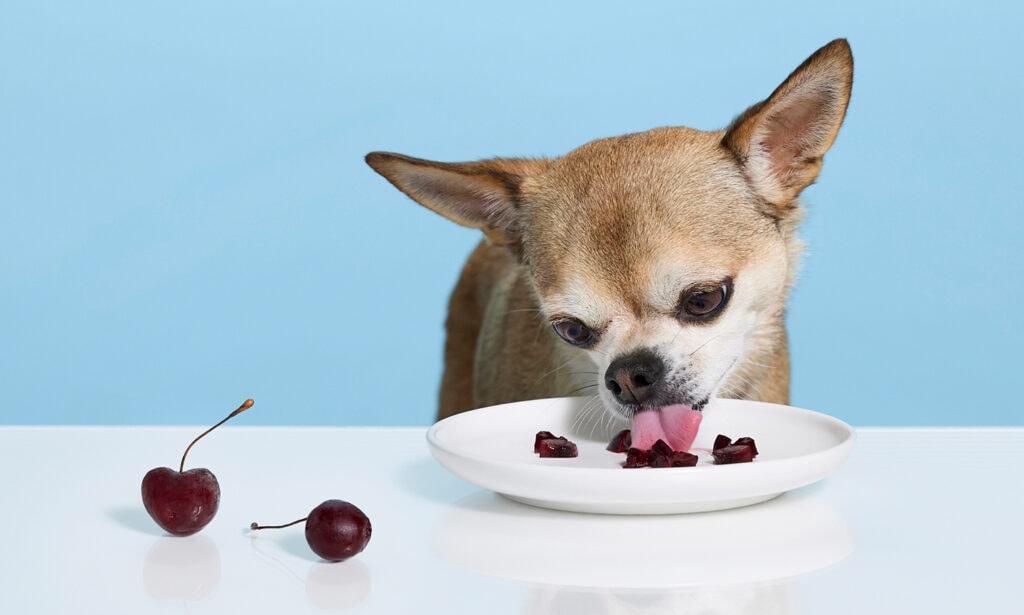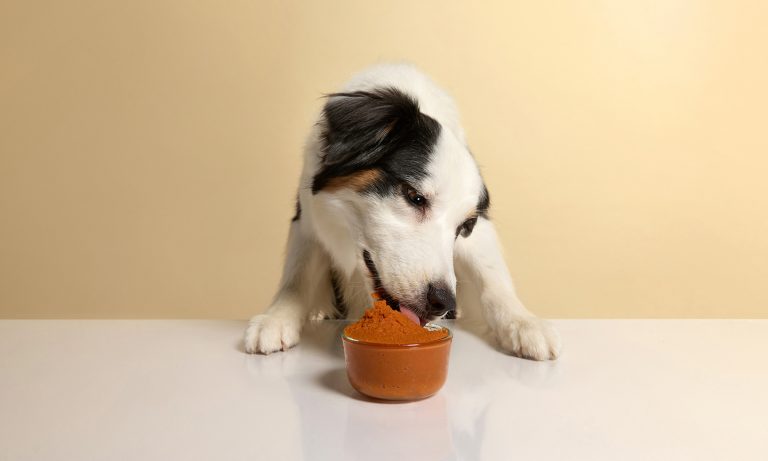No matter whether you prefer sweet or sour cherries, these delightful, deep red—and sometimes heart-shaped!—fruits are suitable for all kinds of recipes, ranging from salads and smoothies and sorbets to slab pies. But can dogs eat cherries as treats too? It depends.
We spoke with two veterinary experts to learn more about cherries, including their health benefits and potential risks, how to safely feed cherries to your dog, and more.
Before introducing any new food into your dog's diet, always check with your veterinarian.
In This Guide:
Can Dogs Have Cherries?
Yes and no—cherries can be both safe and unsafe for dogs and puppies depending on the type of cherry and how they’re prepared, says Bethany Hsia, DVM, mobile veterinarian and co-founder of CodaPet, in Clovis, California.
The flesh of the cherry fruit isn’t toxic to dogs and is generally safe in small amounts. (Hence why cherries can be ingredients in dog diets and treats.) However, cherry pits, stems, and leaves should always be avoided since they can pose significant health risks.
Are Cherries Good for Dogs?
According to research, potential nutritional benefits of cherries include:
- Packed with polyphenols (organic compounds that may be beneficial for overall health), and vitamins and antioxidants, like vitamins C, E, and A
- High fiber content
- Rich in potassium
- Low in calories
Additionally, cherries can be lower in fat than store-bought dog treats, says Shalsee Vigeant, DVM, medical director of Veterinary Emergency Group (VEG) in Sugar Land, Texas.
Even so, she notes that some other fruits and vegetables may be easier to feed your dog that don’t have any risks of obstructions or toxicity, including:
Are Cherries Bad for Dogs?
Cherries are a healthy snack for us, but dogs and cherries aren’t the best combination when they aren’t prepared and served properly.
Before treating your pooch to cherries, it’s important to consider the potential risks, such as:
- Stomach upset: Cherries have a high sugar content that could lead to gastrointestinal symptoms, like vomiting and diarrhea.
- Dental damage: The cherry pit, or stone, is extremely hard on teeth. If your dog were to bite into a pit, it could lead to a fractured or broken tooth.
- Choking hazard: A cherry’s size and hard pit make it a choking hazard for all dogs.
- Intestinal blockage: Depending on how much a dog eats, cherry pits can cause an obstruction in dogs of all sizes, says Dr. Vigeant.
Cherry pits contain trace amounts of cyanide, and a dog would need to eat just a handful of cherries with pits to experience signs of toxicity (depending on the size of the dog, of course).
Symptoms of cyanide poisoning in dogs can include:
- Agitation
- Restlessness
- Discomfort
- Increased panting
- Rapid breathing or difficulty breathing
- Vomiting
- Diarrhea
- Lethargy
- Seizures
If you suspect your dog has ingested cherry pits—or any part of the cherry plant that could lead to cyanide poisoning—or notice any signs that they’re having trouble breathing, call your veterinarian or the Pet Poison Helpline at 855-764-7661 immediately.
How Many Cherries Can I Give My Dog?
Because cherries are not considered an essential part of a balanced, complete dog diet, they’re considered a treat. And treats should not make up more than 10% of your dog’s daily diet (and if your dog is overweight, it should be even less than that).
Dr. Hsia shares a general feeding guideline of how many cherries to give your dog based on their size and weight. Serving sizes will also vary based on the size and variety of the cherry.
Extra-small dogs (2–10 pounds)
½–1 cherry
Small dogs (11–20 pounds)
1–2 cherries
Medium dogs (21–50 pounds)
2–3 cherries
Large dogs (51–90 pounds)
3–4 cherries
Extra-large dog (91+ pounds)
4-5 cherries
Symptoms associated with eating too many cherries or general intolerance can appear from four to eight hours—or up to 24 hours—later and may include stomach upset and discomfort (e.g., bloating), Dr. Vigeant notes.
If you notice anything unusual, stop feeding your dog cherries and consult your vet.
How To Safely Feed Your Dog Cherries
If you’d like to treat your furry friend to cherries, here’s how you can safely prepare them:
- Opt for fresh or frozen cherries, and avoid the canned and jarred varieties. (They usually have added sugar or preservatives.)
- Wash thoroughly to remove dirt, bacteria, and pesticides.
- Remove the cherry stem, leaves, and pit, leaving only the flesh.
- Cut cherries into bite-size pieces to prevent choking hazards.
Cherries can be fed in a few ways, including:
- As a stand-alone treat
- As a food topper, either mixed into their dog food or added to other dog-friendly human foods, like plain yogurt
- As part of a dog-friendly recipe (like these icebox cookies!)
- Stuffed into a classic KONG toy or spread onto a lick mat
Store-Bought Dog Treats With Cherries
Want to skip the prep and spoil your dog with a wag-worthy dog treat made with cherries? These store-bought dog snack options are sure to be a hit for your canine companion!
FAQs About Dogs and Cherries
Q:Are cherry pits poisonous to dogs? Can dogs eat cherries without pits?
A:Cherry pits are poisonous to dogs and can result in life-threatening symptoms if eaten in excessive amounts. Dogs can safely eat cherries without pits in small amounts and in moderation.
Q:Can dogs have maraschino cherries?
A:While maraschino cherries aren’t toxic to dogs, it’s best to steer clear of them because they contain high amounts of sugar and preservatives, which can lead to stomach upset.
Q:Can dogs eat black cherries?
A:Yes, dogs can eat black cherries as long as only the cherry flesh is given.
Q:Can cherries cause diarrhea in dogs?
A:Yes, the high sugar content in cherries can cause diarrhea in dogs. Dogs can also get diarrhea if they eat too many cherries.
This content was medically reviewed by Kelly Gold, DVM, Chewy veterinarian.
Things Your Dog CAN Eat
Share:














